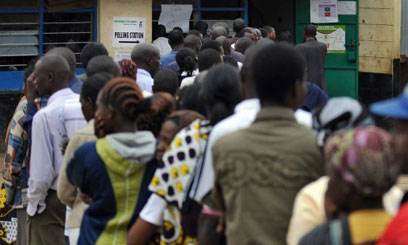NAIROBI, Kenya Jul 25 – The debate on whether to adopt a formula to ensure that at least one third of politicians elected in next year’s polls are women gathered momentum on Monday, with the civil society and women organisations warning of a crisis unless the issue is resolved before the polls.
National Convention Executive Council Executive Director Cyprian Nyamwamu and former Constitution of Kenya Review Commissioner Kavetsa Adagala warned that the country could end up spending Sh3 billion in repeat parliamentary polls if the requirement is not upheld.
“It is that realisation that has made (those of us) who have been part of the democracy and the gender justice movement to now propose a workable formula that will enable us to get the constituencies and elections that will give us a constitutional National Assembly and Senate,” said Mr Nyamwamu.
“We need to work for an amendment to change the electoral politics of this country,” said Dr Adagala.
The Interim Independent Electoral Commission last week proposed a formula to reserve 72 constituencies where only women will be eligible for election.
According to the Interim Independent Electoral Commission (IIEC) the outcome of the 2012 elections has to ensure that there are at least 116 women MPs in the National Assembly and at least 23 women in the Senate.
If this does not happen, then there would emerge a real danger of the country ending up with an illegal government.
Constitutional experts have noted that if the number of elected women did not hit the one third mark, then the Senate and the National Assembly would be “unlawful.”
Article 3(2) of the Constitution says that any attempt to establish a government otherwise than in compliance with this Constitution is unlawful.
Constitutional expert Jill Ghai however downplayed the claims of a constitutional crisis.
She argues that the Article 27 (a) suggests some of the requirements in the new constitution shall be attained progressively. She says the Constitution obligates the State to make laws and policies to ensure that “not more than two thirds of the members of elective or appointive bodies shall be of the same gender.”
“Our whole argument is that there is a constitutional crisis possibility, but my argument is that they are misreading the Constitution; because there is no binding requirement for the National Assembly to have more than two-thirds men,” Ms Ghai explained.
Nominated MP Sophia Abdi was however adamant that the provision is to be met in the next elections.
“It is a mandatory, constitutional right that is given to the women because they struggled for it which we are saying we must put a system in place that will address those issues,” she stated.










































